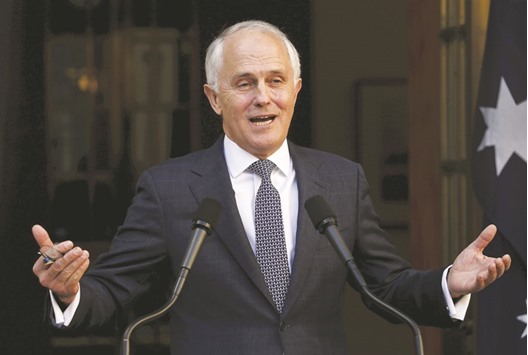Australia’s borrowings are set to rise as Prime Minister Malcolm Turnbull retreats from proposals to increase the nation’s sales tax, making it harder to rein in record government debt.
Any tax changes would be focused on generating economic growth and jobs, Turnbull said, and he didn’t address the debt, speaking on Sunday. Australia’s debt will reach A$552bn ($389bn) in the 2018-2019 fiscal period, almost four times the level of 10 years earlier, based on government projections. That will take it to 28.9% of gross domestic product, from 8% in 2008-9, the estimates show.
The state of Western Australia had its debt rating cut on Monday by one step to Aa2, the third-highest ranking at Moody’s Investors Service, reflecting revenue declines caused by declining iron ore prices and an increasing risk the state’s debt burden will be higher than it has indicated. The move underscores the risks facing debt holders as investment in its mining industry wanes. Australia’s sovereign obligations hold the highest ratings at Moody’s and Standard & Poor’s.
“With the amount of supply coming in, it suggests to me we’ve probably gotten a little bit too expensive,” said Roger Bridges, chief global strategist for interest rates and currencies in Sydney at Nikko Asset Management Co’s Australian unit, which oversees $15.1bn. “The supply issue is a negative for our bond market.”
The government could use a pickup in economic growth in coming years as an opportunity to tighten fiscal policy, Adam Boyton, the Sydney-based chief economist in Australia at Deutsche Bank, wrote in a report yesterday. The shift would supplement the use of interest rates in cooling the economy if needed and be a more activist use of fiscal policy, according to the report. “Given the sizable budget deficit, the continual delays in returning to surplus and some risk to Australia’s AAA credit rating, perhaps a change in thinking is warranted,” Boyton wrote. Australian bonds rose yesterday as part of a global debt-market rally as tumbling stocks drove demand for the safest assets. Benchmark 10-year yields fell 20 basis points to 2.4% as of 3:12 pm in Sydney. The yield is the lowest since April.

Turnbull: Any tax changes would be focused on generating economic growth and jobs.
